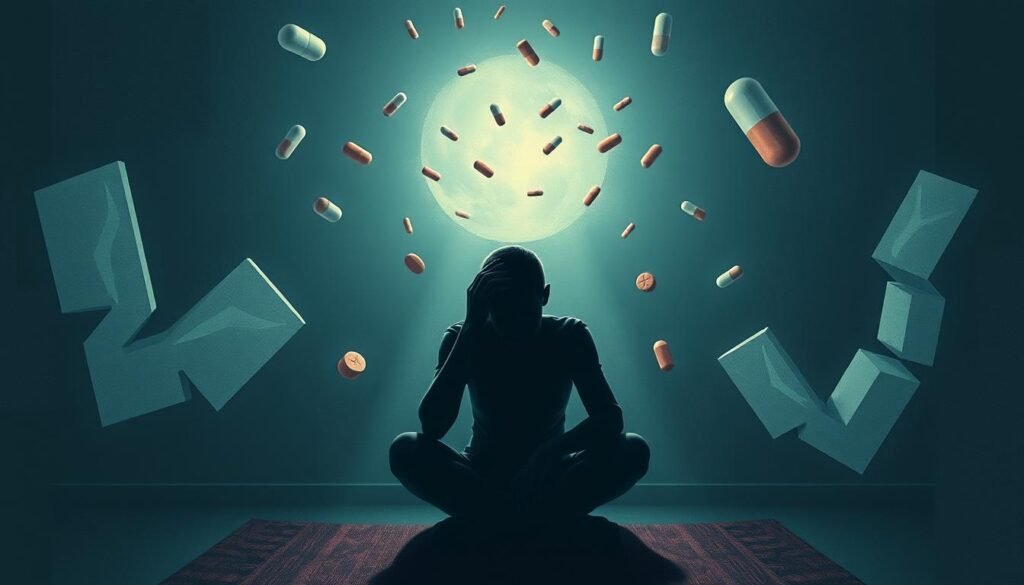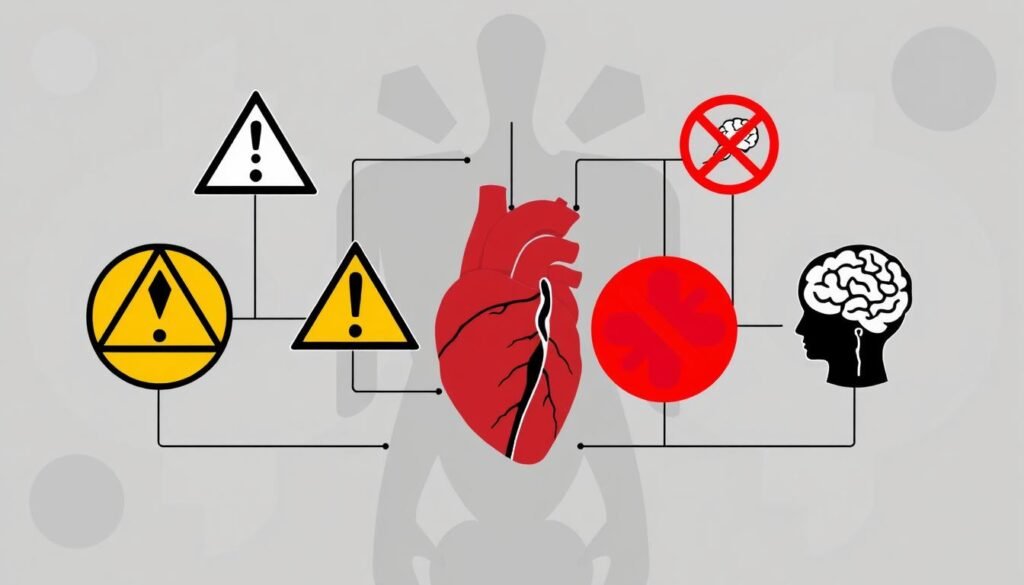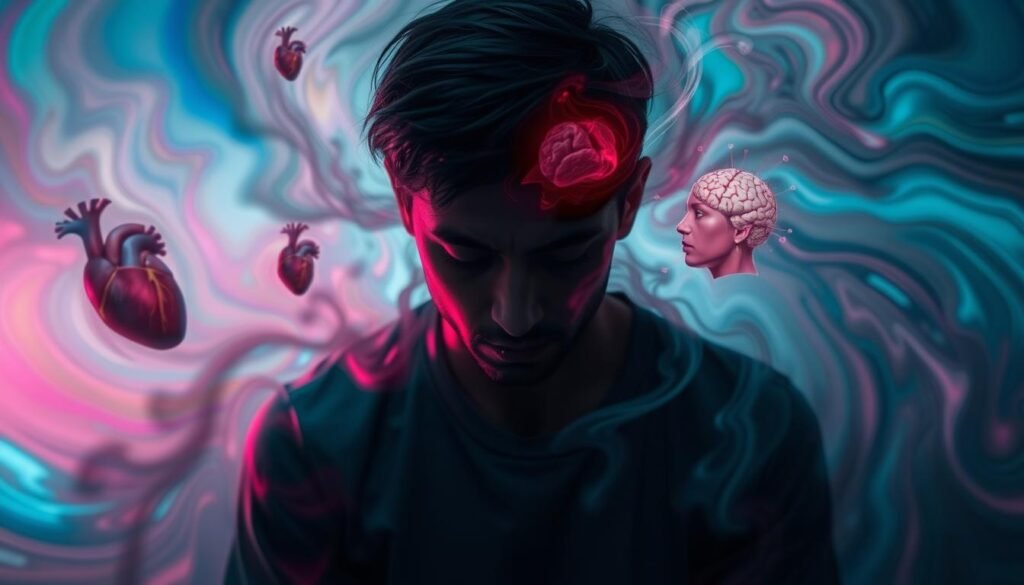Did you know kids and young adults up to 24 who take meds like trazodone might think more about suicide? This fact shows how crucial it is to know the potential side effects and risks of Trazodone. This drug is often used to treat depression. It works by affecting serotonin, a brain chemical, but it also comes with real worries.
Before starting trazodone, people need to look at the trazodone side effects list. You might get sleepy, dizzy, or find your hunger changing. In worse cases, trazodone could lead to serotonin syndrome, a dangerous condition, among other health issues.
Having doctors check on you when you start taking trazodone is key. Talking about the trazodone precautions and weighing the pros against the cons is a critical step for anyone taking this medication.
Key Takeaways
- Individuals under 18 should avoid trazodone unless necessary and prescribed by a doctor.
- Monitoring during treatment initiation is critical to address potential suicidal thoughts.
- Side effects can include drowsiness and dizziness, affecting daily activities.
- Patients are encouraged to read the Medication Guide thoroughly from the FDA website.
- Gradual dosage reduction is essential to prevent withdrawal symptoms.
- Open communication with healthcare providers regarding medications and conditions is crucial.
- The combination of trazodone with alcohol may enhance drowsiness and other risks.
Introduction to Trazodone
Trazodone is an antidepressant that helps fight depression. It boosts serotonin in the brain to improve mood. Trazodone introduction often includes its use for insomnia, anxiety, and other medication side effects.
It’s important to know how to use trazodone safely. Long-term use can cause withdrawal and dependence. Side effects like drowsiness, dizziness, and constipation can affect your life.
If you’re having trouble with trazodone, get help. Treatment centers offer support and careful treatment plans. They help you recover safely.
Understanding the Mechanism of Trazodone
Trazodone works by changing how serotonin acts in the brain. This change helps reduce depression symptoms and boosts mood. Knowing how trazodone works is crucial.
Trazodone is taken by mouth in pill form. It’s best taken with food to work well. It may take weeks to see the full benefits, so it’s important to keep taking it as directed.
The use of trazodone has grown over time. In the past, it was mainly for treating serious sleep issues in depressed folks. But now, it’s also used for sleep problems in those who aren’t depressed.
It’s been proven very effective for sleep, with almost all studies showing it works. At low doses (25-100 mg), it improves sleep without making you sleepy during the day. But for depression, much higher doses (150-600 mg) might be needed.
In short, trazodone’s wide range of uses makes it key for treating sleep and mood problems. It’s a very important drug for many people.
Potential Side Effects and Risks of Trazodone
Trazodone is used to treat depression and sleep problems. But it can have side effects. It’s important for patients and doctors to know about these. This helps use trazodone safely. Side effects vary from common to serious.
Common Side Effects
Some people taking trazodone may face common issues. These include:
- Feeling sleepy or tired
- Headaches
- Nausea or feeling sick
- Constipation
- A dry mouth
These common side effects can disrupt daily life. Even though they’re not dangerous, they matter for your daily comfort.
Serious Side Effects
Serious side effects from trazodone are not common. They happen to less than 1 in 1,000 people. But they need quick medical help. Here are some serious problems to look out for:
- Yellowing of the eyes or skin
- Trouble going to the bathroom
- Easy bruising or more infections
- Abnormal heartbeat
- Long-lasting painful erections (priapism)
- Seizures
- Thoughts of hurting yourself
Stay alert for signs like swelling, having a hard time breathing, or feeling very down. Serious side effects from trazodone are rare. But they can be very harmful to your health.
Trazodone Adverse Reactions
Trazodone is often given to help with depression and sleep problems. It’s important to know about its side effects for safe use. Talking with doctors often and early spotting of side effects is key. People taking it might feel dizzy, very tired, sleepy, or lose weight without trying. If someone has a serious reaction, they need to get help right away.
Identifying Adverse Reactions
Reactions to trazodone can be small or big. You might notice:
- Unintentional weight loss
- Swelling
- Drowsiness
- Blurry vision
- Stomach troubles like diarrhea and feeling sick
- Being very tired and headaches
Though it’s rare, some side effects of trazodone are serious:
- Heartbeat that’s not normal
- Orthostatic hypotension
- Signs of serotonin syndrome
- Low sodium levels
- Higher risk of bleeding
- Big mood changes, including thoughts of suicide
The FDA warns that trazodone might lead to suicidal thoughts and actions, especially in younger adults. Knowing these risks is very important for patients and those taking care of them.
When to Seek Medical Attention
If serious side effects happen with trazodone, getting help fast is crucial. Watch out for:
- Swelling in the lips, mouth, or throat
- Fast or hard breathing
- Extreme tiredness that hides other issues
- Heartbeat changes or unusual bruising
- Symptoms of serotonin syndrome
Knowing when and how to react to these side effects can save lives. Always talk openly with your healthcare team to stay safe while using trazodone.

| Adverse Reaction | Severity | Action Required |
|---|---|---|
| Mild Side Effects | Mild | Watch symptoms; speak with a doctor if they don’t go away |
| Severe Allergic Reaction | Severe | Go to the doctor right away |
| Suicidal Thoughts | Severe | Call your doctor right now |
| Serotonin Syndrome | Severe | Get emergency help |
Trazodone Safety Concerns
Trazodone helps with mental health issues but needs careful handling due to risks. It’s vital for users to follow their doctor’s advice closely, especially when dealing with certain health problems. This helps everyone stay safe while using this medication.
General Precautions
Prior to starting trazodone, it’s important to tell your doctor about your medical history. Essential topics include any cases of bipolar disorder or heart issues, which may raise serious side effects risks. Keeping up with doctor visits is key to ensure safety, as trazodone can sometimes cause suicidal thoughts.
Special Populations
Prescribing trazodone to children and teens requires extra caution. They have a higher chance of negative effects, making it vital to weigh the pros and cons carefully. Older adults may also experience more side effects, such as drowsiness and a condition that affects the heart’s rhythm. Frequent check-ups help in reducing these risks for vulnerable groups.
| Population Group | Risks | Precautions |
|---|---|---|
| Children & Adolescents | Increased risk of adverse reactions | Careful risk-benefit analysis required |
| Older Adults | Higher sensitivity to drowsiness, dizziness, QT prolongation | Close monitoring of side effects |
It’s important for patients to note any side effects and report them to improve drug safety. In the US, you can report side effects to the FDA at 1-800-FDA-1088. In Canada, the line is 1-866-234-2345. Following safety guidelines for trazodone is crucial. For more details, check the importance of adhering to safety measures.
Trazodone Contraindications
Trazodone comes with important contraindications to note. Some people need to be careful or look for other options. If you’re on monoamine oxidase inhibitors (MAOIs), steer clear of trazodone. It could lead to confusion, agitation, and high blood pressure.
If you’ve had allergic reactions to trazodone, it’s not for you. Certain health issues, like some heart diseases, could get worse. Especially, if you already have heart rhythm problems, the risk of QT prolongation is real.
People with liver or kidney problems should talk to their doctors first. Your trazodone dose might need adjusting. It’s important to have regular check-ups to safely adjust the dose and track your progress.
Taking trazodone with other meds that affect serotonin is risky. It could cause serotonin syndrome, a serious health issue. Always tell your doctor about all your medications, even supplements.
To use trazodone safely, knowing the contraindications is key. With the right knowledge and doctor’s guidance, you can minimize risks. For more info, check this resource.

Trazodone Interactions
It’s very important to know about trazodone drug interactions if you’re thinking of taking this medication. Some medications to avoid with trazodone may cause severe side effects. This includes serotonin syndrome, which is very dangerous. Before starting trazodone, you should check all your medications with a doctor.
Medications to Avoid
Be careful when mixing trazodone with certain meds:
- Monoamine oxidase inhibitors (MAOIs)
- Certain pain relievers
- St. John’s Wort
- Lithium
These combos can lead to serious problems. They may increase side effects like too much sleepiness, getting dizzy, or even death in rare cases.
Suggesting Alternatives
For those needing something different from trazodone, there are other paths to explore. These choices might be:
- Other antidepressants like selective serotonin reuptake inhibitors (SSRIs)
- Cognitive-behavioral therapy (CBT)
- Changing your lifestyle, like more exercise or practicing mindfulness
If you’re thinking about medications like trazodone, talk it over with your doctor. They can help you find the best treatment based on what you need.
Recognizing Trazodone Overdose Symptoms
Trazodone overdose can show many symptoms, and they can be serious. Some main symptoms include being very sleepy, getting confused, and having trouble breathing. Someone might also feel dizzy, have seizures, and notice their heartbeat isn’t regular. It’s crucial to know these signs because they mean there might be an overdose, which can cause big problems.
About 41% of people who take trazodone might feel sleepy or sedated because it’s a common side effect. Overdose can also lead to throwing up and experiencing priapism, which means having a painful erection that won’t go away. These signs are serious and need fast medical help to avoid worse outcomes.

Statistics show that 12% of patients overdosing on trazodone had QTc prolongation. Only 7% experienced low blood pressure. Knowing these facts is crucial, especially when trazodone is used with other drugs. It shows why it’s important to watch for overdose signs closely.
Trazodone reaches its highest level in the bloodstream about one to two hours after taking it. This can happen faster on an empty stomach. Its effects can last from three to nine hours. This means symptoms of an overdose can appear soon after taking too much. Significant overdoses need quick medical care to reduce risks.
Quickly recognizing and acting on overdose signs can greatly improve chances of getting better. It highlights why it’s key to teach both users and health professionals about the risks of trazodone misuse. Everyone should be careful when prescribing and using this medication.
| Symptom | Potential Severity |
|---|---|
| Drowsiness | Moderate to Severe |
| Respiratory difficulties | Severe |
| Dizziness | Moderate |
| Seizures | Severe |
| Irregular heartbeat | Severe |
| Priapism | Moderate to Severe |
Trazodone Withdrawal Effects
Stopping trazodone can lead to tough withdrawal symptoms. It’s vital to know these effects when cutting back on the medication. Trazodone, an antidepressant, can cause dependency in some people. So, it’s important to be careful during withdrawal.
Withdrawal Symptoms
Withdrawal brings various symptoms like:
- Nausea
- Dizziness and vertigo
- Headaches
- Irritability
- Trouble concentrating
- Chills and depersonalization
- Suicidal ideation in severe cases
The symptoms can last from one week to over a month. This shows why it’s key to slowly stop taking it with a doctor’s help.
Psychological symptoms such as anxiety and mood swings, can make withdrawal harder. If you’re worried about these effects, you can learn more here.
Knowing about these issues helps you and your support team get ready for the change. Understanding how to handle withdrawal symptoms is crucial for recovery and well-being.
Trazodone Long-Term Risks
Trazodone is popular for treating depression and sleep issues. Yet, long-term use of trazodone requires caution. Users should know about the potential risks of using it for a long time. For example, using trazodone for many years might lead to heart problems and the chance of becoming dependent on it.
When it comes to the brain, trazodone could slow down memory loss. Users might see a smaller drop in their mental test scores compared to those not taking it. This suggests trazodone might help with certain brain issues tied to aging, like Alzheimer’s disease.
However, trazodone’s long-term use comes with several serious risks. These include thoughts of suicide, serotonin syndrome, irregular heartbeat, and a higher risk of bleeding. Up to 5% of users might notice weight changes, and some could have lower blood pressure. These dangers show why talking to doctors regularly is crucial.
Talking to doctors about using trazodone, including for sleep, is important. It helps understand how it works with other medicines. Keeping an eye on health and how the drug affects you can make managing its risks easier.
Conclusion
Trazodone is good for treating depression, especially in older adults. It’s crucial to know the risks of trazodone. Even though it’s mostly safe and easy to tolerate, it can cause sleepiness, dizziness, and dry mouth.
It’s important for patients and their families to know about the different forms of trazodone. These include immediate-release, prolonged-release, and extended-release. This helps customize the treatment for each person’s needs. Talking regularly with healthcare providers is key to keeping track of how the treatment is working and managing the medication safely.
The main takeaways about trazodone stress the need for being aware and educated about this drug. It’s necessary to weigh the pros and cons of using trazodone, especially for people with special needs. Keeping an open line of communication with doctors is important for the best results and to reduce side effects. For more details, please check this guide on trazodone.